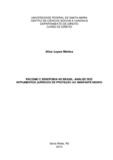| dc.contributor.advisor | Redin, Giuliana | |
| dc.creator | Mattos, Alice Lopes | |
| dc.date.accessioned | 2017-04-26T04:50:42Z | |
| dc.date.available | 2017-04-26T04:50:42Z | |
| dc.date.issued | 2016-12-19 | |
| dc.date.submitted | 2016 | |
| dc.identifier.uri | http://repositorio.ufsm.br/handle/1/2796 | |
| dc.description | Trabalho de conclusão de curso (graduação) - Universidade Federal de Santa Maria, Centro de Ciências Sociais e Humanas, Curso de Direito, RS, 2016. | por |
| dc.description.abstract | The arrival of immigrants to Brazil is increasing, as are the discriminatory cases against them. However, the "aversion to the foreigner" is selective, being perpetrated mainly against black immigrants, who are doubly vulnerable, because more than due to their nationality - xenophobia - they suffer prejudice due to the color of their skin - racism. In this context, the objective is to verify the performance of the Public Power, more precisely of the Legislative, in the prevention and repression of xenophobic and racist attitudes carried out against black immigrants in Brazil. For this, it is important to observe the Brazilian history and to realize that since the nineteenth century the migratory and racial issues are interconnected, because it was due to the exclusion and inferiorization of the black ex-slave that the state fostered white and European immigration. However, Brazil has always declared itself as a country without prejudice, and there arises the myth of racial democracy, which is still alive today. In the legislative sphere, the Federal Constitution of 1988, pioneered the repudiation of racism in the list of fundamental rights. As a result, Law No. 7166/1989 was issued, and international treaties and other norms added to combat and repress racism. But specifically to the prejudice perpetrated against the immigrant, the legal system is silent, because the current Foreigner Statute still envisions the immigrant through the bias of national security and mercantilization, and there are still many advances. Based on this the present research was structured, making use of the Dialectial approach method and historical, descriptive and bibliographic procedure methods. It is intended that the results can contribute to foment the debate about the prejudice against the black immigrant, mainly helping to understand it from a humanistic and protective perspective. | eng |
| dc.language | por | por |
| dc.publisher | Universidade Federal de Santa Maria | por |
| dc.rights | Acesso Aberto | por |
| dc.subject | Imigrantes negros | por |
| dc.subject | Racismo | por |
| dc.subject | Xenofobia | por |
| dc.subject | Legislação protetiva | por |
| dc.subject | Black immigrants | eng |
| dc.subject | Racism | eng |
| dc.subject | Xenophobia | eng |
| dc.subject | Protective legislation | eng |
| dc.title | Racismo e xenofobia no Brasil: análise dos intrumentos jurídicos de proteção ao imigrante negro | por |
| dc.title.alternative | Racism and xenophobia in Brazil: analysis of the legal instruments of protection of the black immigrant | eng |
| dc.type | Trabalho de Conclusão de Curso de Graduação | por |
| dc.degree.local | Santa Maria, RS, Brasil | por |
| dc.degree.graduation | Curso de Direito | por |
| dc.description.resumo | A vinda de imigrantes ao Brasil é crescente, assim como os casos discriminatórios em face deles. No entanto, a “aversão ao estrangeiro” se mostra seletiva, sendo perpetrado principalmente contra imigrantes negros, os quais são duplamente vulneráveis, pois mais que devido à sua nacionalidade – xenofobia - sofrem preconceito devido à cor da sua pele - racismo. Nesse contexto, objetiva-se verificar a atuação do Poder Público, mais precisamente do Legislativo, na prevenção e repressão de atitudes xenofóbicas e racistas levadas a efeito contra imigrantes negros no Brasil. Para isso, importante observar a história brasileira e perceber que desde o século XIX as questões migratórias e raciais se interligam, pois foi devido à exclusão e inferiorização do negro ex-escravo que o Estado fomentou a imigração branca e europeia. No entanto, o Brasil sempre se autodeclarou como um país sem preconceito, surgindo aí o mito da democracia racial, que vige até hoje. No âmbito legislativo, a Constituição Federal de 1988, pioneiramente, pôs o repúdio ao racismo no rol de direitos fundamentais. Na sequência, editou-se a Lei n° 7.716/1989, havendo ainda tratados internacionais e outras normas que se acrescentam ao combate e a repressão ao racismo. Mas especificamente ao preconceito perpetrado em face do imigrante, o ordenamento jurídico é silente, porque o Estatuto do Estrangeiro vigente ainda visualiza o imigrante através do viés da segurança nacional e mercantilização, sendo necessários muitos avanços. Com base nisso foi estruturada a presente pesquisa, fazendo uso do método de abordagem dialético e dos métodos de procedimento histórico, descritivo e bibliográfico. | por |
| dc.publisher.unidade | Centro de Ciências Sociais e Humanas | por |


